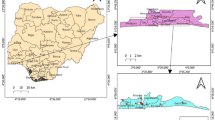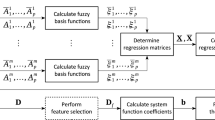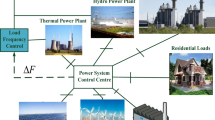Abstract
This paper presents the application of fuzzy particle swarm optimization to constrained economic load dispatch (ELD) problem of thermal units. Several factors such as quadratic cost functions with valve point loading, ramp rate limits and prohibited operating zone are considered in the computation models. The Fuzzy particle swarm optimization (FPSO) provides a new mechanism to avoid premature convergence problem. The performance of proposed algorithm is evaluated on four test systems. Results obtained by proposed method have been compared with those obtained by PSO method and literature results. The experimental results show that proposed FPSO method is capable of obtaining minimum fuel costs in fewer numbers of iterations.






Similar content being viewed by others
References
J. Wood, B.F. Wollenberg, Power generation, operation, and control, 2nd edn. (Wiley, New York, 1996)
H. Nicholson, J.W. Lynn, The economic loading of transmission systems. Proc. IEE Part C Monogr. IET J. 105(8), 407–419 (1958)
E.F. Hill, W.D. Stevenson, An improved method of determining incremental loss factors from power system admittances and voltages. IEEE Trans. Power Appar. Syst. 87(6), 1419–1425 (1968)
M.Y. Akhtar, New approach for economic load scheduling. Proc. Inst. Electr. Eng. IET J. 116(4), 533–538 (1969)
L.H. Fink, H.G. Kwatny, J.P. Mcdonald, Economic dispatch of generation via valve-point loading. IEEE Trans. Power Appar. Syst. 88(6), 805–811 (1969)
L.J. Rindt, Economic scheduling of generation for planning studies. IEEE Trans. Power Appar. Syst. 88(6), 801–804 (1969)
A.M. Sasson, Nonlinear programming solutions for load-flow, minimum-loss, and economic dispatching problems. IEEE Trans. Power Appar. Syst. 88(4), 399–409 (1969)
R.N. Dhar, P.K. Mukherjee, Reduced-gradient method for economic dispatch. Proc. Inst. Electr. Eng. 120(5), 608–610 (1973)
C.L. Wadhwa, J. Nanda, New approach to modified co-ordination equations for economic load dispatch. Proc. Inst. Electr. Eng. 123(9), 923–925 (1976)
I. Megahed, N. Abou-Taleb, E. Iskandrani, A. Moussa, A modified method for solving the economic dispatching problem. IEEE Trans. Power Appar. Syst. PAS 96(1), 124–133 (1977)
Warsono, D.J. King, C.S. Ozveren, Economic load dispatch for a power system with renewable energy using direct search method. In 42nd International Universities Power Engineering Conference, 4–6 September (2007), pp. 1228–1233
Y. Fukuyama, Y. Ueki, An application of artificial neural network to dynamic economic load dispatching. In Proceedings of the First International Forum on Applications of Neural Networks to Power Systems, 261–265, 23–26 (1991)
J.H. Park, Y.S. Kim, I.K. Eom, K.Y. Lee, Economic load dispatch for piecewise quadratic cost function using Hopfield neural network. IEEE Trans. Power Syst. 8(3), 1030–1038 (1993)
D.C. Walters, G.B. Sheble, Genetic algorithm solution of economic dispatch with valve point loading. IEEE Trans. Power Syst. 8(3), 1325–1332 (1993)
A. Bakirtzis, V. Petridis, S. Kazarlis, Genetic algorithm solution to the economic dispatch problem. IEE Proc. Gener. Trans. Distrib. 141(4), 377–382 (1994)
K.P. Wong, Y.W. Wong, Genetic and genetic/simulated-annealing approaches to economic dispatch. IEE Proc. Gener. Trans. Distrib. 141(5), 507–513 (1994)
J.H. Park, S-O. Yang, H-S. Lee, Economic load dispatch using evolutionary algorithms. In Proceedings International Conference on Intelligent Systems Applications to Power Systems, 441–445, 28 January-2 February, 1996
S.S. Subramani, P.R. Rajeswari, A modified particle swarm optimization for economic dispatch problems with non-smooth cost functions. Int. J. Soft Comput. 3(4), 326–332 (2008)
A. Bhattacharya, P.K. Chattopadhyay, A modified particle swarm optimization for solving the non-convex economic dispatch. In 6th International Conference on Electrical Engineering/Electronics, Computer, Telecommunications and Information Technology (ECTI-CON), 01, 78–81, 2009
K. Chandram, N. Subrahmanyam, M. Sydulu, Secant method with PSO for economic dispatch with valve point loading. In IEEE Power and Energy Society General Meeting, 1–6, 26–30 July, 2009
P. Chen, C. Zhao, J. Li, Z. Liu, Solving the economic dispatch in power system via a modified genetic particle swarm optimization. Int. Joint Conf. Comput. Sci. Optim. 1, 201–204 (2009)
N. Sinha, B. Purkayastha, B.S. Purkayastha, Hybrid PSO/self-adaptive evolutionary programs for economic dispatch with nonsmooth cost function. Int. J. Recent Trends Eng. 1(3), 195–200 (2009)
A.Y. Saber, T. Senjyu, M. Tsukasa, U. Naomitsu, F. Toshihisa, Unit commitment by heuristics and absolutely stochastic simulated annealing. IET Gener. Trans. Distrib. 1(2), 234–243 (2007)
P. Yadmellat, S.M.A. Salehizadeh, M.B. Menhaj, Fuzzy parameter particle swarm optimization. In First International Conference on Intelligent Networks and Intelligent Systems, pp. 93–98, 2008
D.K. Chaturvedi, Soft computing: applications to electrical engineering problem (Springer, Berlin, 2008)
D.K. Chaturvedi, Modeling and simulation of systems using Matlab@/Simulink@ (CRC Press, New York, 2009)
K.R. Krishnand, P.K. Rout, B.K. Panigrahi, A. Mohapatra, Solution to non-convex electric power dispatch problem using deeker optimization algorithm. In International Conference on Swarm, Evolutionary, and Memetic Computing, 2010
Z.L. Gaing, Particle swarm optimization to solving the economic dispatch considering the generator constraints. IEEE Trans. Power Syst. 18(1), 198–205 (2003)
C. Jiejin, M. Xiaqian, L. Lixiang, P. Haipeng, Chaotic particle swarm optimization for economic dispatch considering the generator constraints. Energy Convers. Manag. 48, 645–653 (2007)
A.I. Selvakumar, K. Thanushkodi, A new particle swarm optimization solution to nonconvex economic dispatch problems. IEEE Trans. Power Syst. 22(1), 42–51 (2007)
J.-B. Park, K.Y. Lee, J.-R. Shin, K.Y. Lee, A particle swarm optimization for economic dispatch with nonsmooth cost functions. IEEE Trans. Power Syst. 20(1), 34–41 (2005)
H. Chen, S.N. Yeh, particle swarm optimization for economic power dispatch with valve-point effects. In IEEE PES Transmission and Distribution Conference and Exposition, pp. 1–5, 2006
Author information
Authors and Affiliations
Corresponding author
Rights and permissions
About this article
Cite this article
Chaturvedi, D.K., Kumar, S. Solution to Electric Power Dispatch Problem Using Fuzzy Particle Swarm Optimization Algorithm. J. Inst. Eng. India Ser. B 96, 101–106 (2015). https://doi.org/10.1007/s40031-014-0122-z
Received:
Accepted:
Published:
Issue Date:
DOI: https://doi.org/10.1007/s40031-014-0122-z




